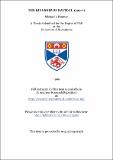Files in this item
The kingship of David II, 1329-71
Item metadata
| dc.contributor.advisor | Macdougall, Norman | |
| dc.contributor.author | Penman, Michael A. | |
| dc.coverage.spatial | xxi, 616 p. | en_US |
| dc.date.accessioned | 2018-06-18T14:12:47Z | |
| dc.date.available | 2018-06-18T14:12:47Z | |
| dc.date.issued | 1999-05 | |
| dc.identifier.uri | https://hdl.handle.net/10023/14208 | |
| dc.description.abstract | This thesis examines the kingship of David II, king of Scots (1329-71), son of Robert Bruce (Robert I, 1306-29). It seeks to outline and assess just what style and policies of kingship David adopted and adapted to meet the rapidly changing circumstances of his reign. Chapter 1 assesses the legacy of kingship, patronage, civil war and diplomacy which the apparently successful usurper, Robert I, left to his five year old son and his supporters. Chapter 2 appraises the exercise of government, warfare and crown- magnate relations by the pro-Bruce Scots during David II's minority and exile in France (1329-41) in the face of the renewed military and political challenge of Edward Balliol, the Disinherited and Edward III of England. Chapter 3 interrupts the detailed narrative to present a thematic overview of David's kingship and his particular use of chivalric lordship as a means of raising and rewarding support for his court and policies (and how this lordship had to be modified in response to David's changing personal and political circumstances). Chapter 4 resumes the narrative analysis by investigating David's reassertion of Bruce royal authority in Scotland from June 1341 and how David's relations with his key subjects contributed directly to his capture in battle against England at Neville's Cross near Durham in October 1346.1 Chapter 5 looks at David's eleven year struggle to secure his release from captivity in England; in particular, it details the diplomatic deals with England which David proposed and the nature of the opposition in Scotland to these plans led by David's nephew and heir presumptive, Robert the Steward (Robert II, 1371-90). Chapter 6 examines David's reassertion of royal authority after October 1357 and the crisis in 1359 which was provoked by the crown's attempt to cancel the king's 100,000 merks ransom (which the Scots agreed to pay for David's release in 1357) by arranging a peace deal with England which included a place for a Plantagenet in the succession to the Scottish kingship. Chapter 7 evaluates David's reassertion of authority after the 1359 crisis and how his growing interference in the territorial and political interests of his greatest subjects - and his continued diplomatic manoeuvering - provoked the rebellion of Robert the Steward and the earls of Douglas and March against the crown in spring 1363. Chapter 8 assesses how David put down that rebellion and used his victory to attempt another Anglo-Scottish succession-peace deal, but without success. Chapter 9 examines David's continued efforts to secure an Anglo-Scottish succession-peace deal and to undermine the positions of his regional magnate opponents in Scotland; and how his failure to make real headway in these areas, and in the provision of a Bruce heir, threatened to provoke a further crown-magnate confrontation c. 1368-9. Chapter 10 analyses how David averted this impending crisis by divorcing his second wife and by seeking a third, backed by a strong magnate coalition; with this support David had begun to approach a position of unexampled authority and to exert his will over his magnate opponents by the time of his unexpected death in February 1371, aged just 47. The thesis is concluded with a summary evaluation of the unique style and policies of kingship which the pro-active David II had been able to develop to suit the rapidly changing circumstances of his reign. This style and these policies contributed to an arguably unprecedented level of royal authority in medieval Scotland; yet their ultimate aim and outcome remained unrealised and, to some extent, unpredictable. | en_US |
| dc.language.iso | en | en_US |
| dc.publisher | University of St Andrews | |
| dc.subject.lcc | DA783.43P4 | en |
| dc.subject.lcsh | David II, King of Scotland, 1323 or 1324-1370 or 1371 | en |
| dc.subject.lcsh | Scotland--History--1057-1603 | en |
| dc.title | The kingship of David II, 1329-71 | en_US |
| dc.type | Thesis | en_US |
| dc.contributor.sponsor | Carnegie Trust for the Universities of Scotland | en_US |
| dc.contributor.sponsor | University of St Andrews. Department of Scottish History | en_US |
| dc.type.qualificationlevel | Doctoral | en_US |
| dc.type.qualificationname | PhD Doctor of Philosophy | en_US |
| dc.publisher.institution | The University of St Andrews | en_US |
This item appears in the following Collection(s)
Items in the St Andrews Research Repository are protected by copyright, with all rights reserved, unless otherwise indicated.

